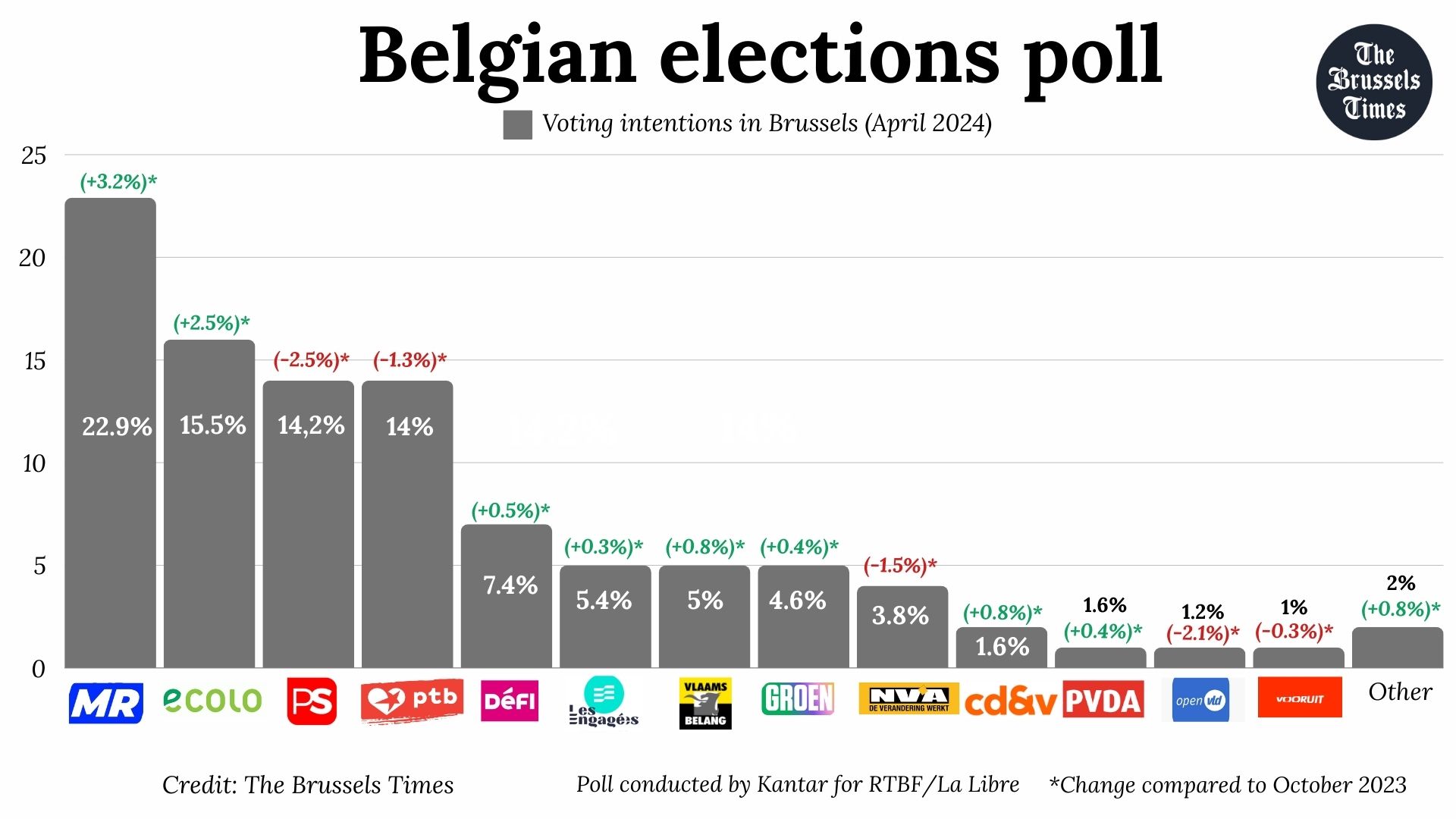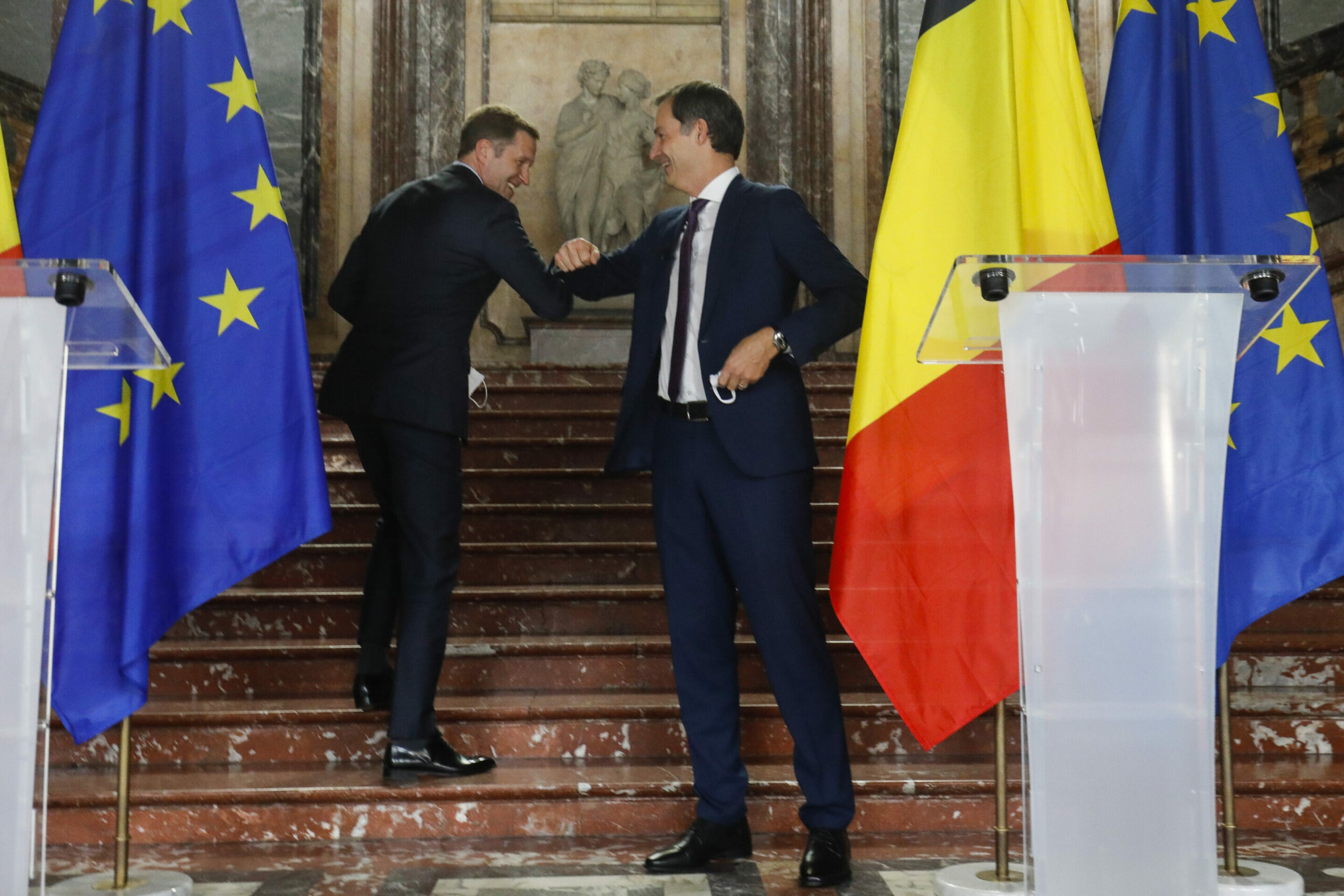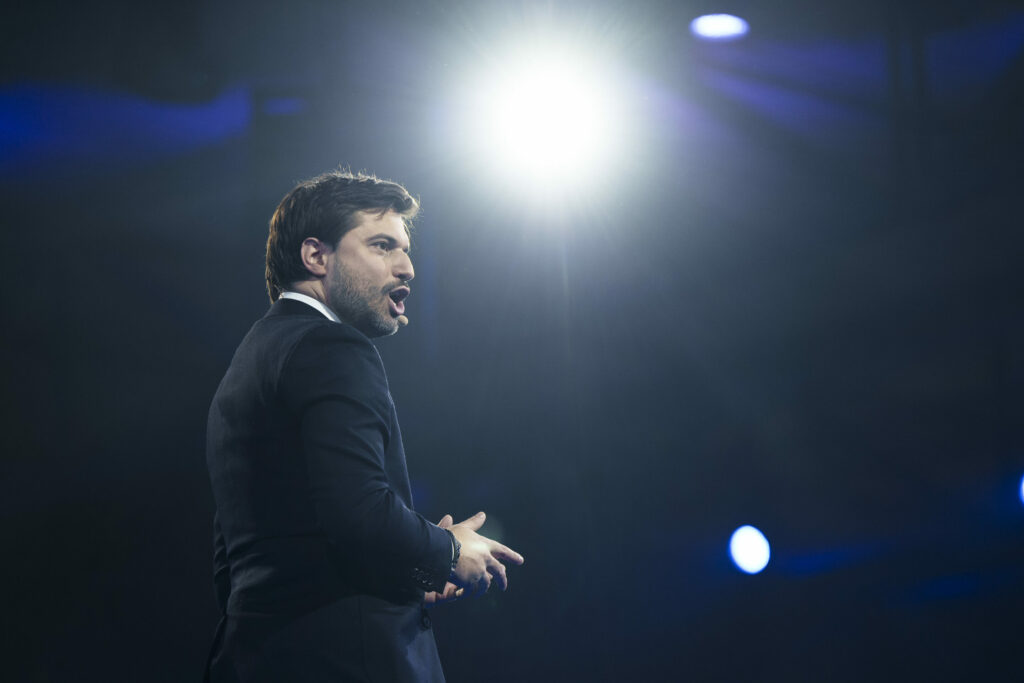French-speaking liberals Mouvement Reformateur (MR) has regained the top position in Brussels in the latest electoral opinion polls – and could become the largest party in French-speaking Belgium, overtaking the Socialist Party (PS).
Conducted by French-speaking media RTBF and La Libre between 8-18 April 2024, the new poll results have painted a possible electoral picture for the June elections in Belgium, with Belgians electing their federal, regional and European representatives on 9 June.
In Brussels, MR (22.9%) is now 7 percentage points clear of Ecolo (15.5%), the French-speaking green party, which has also pulled ahead of a declining Socialist Party (PS) at 15.5% and the left-wing Belgian Workers Party (PTB) at 15%. PTB-PVDA do not appear to have maintained its lead in the Belgian capital from the previous two polls. MR had led polls between March and December 2023, having previously displaced the PS.
Amid the lower-scoring parties in the Belgian capital, Flemish greens Groen (4.6%) also rose alongside their French-speaking counterparts, while N-VA (3.8%) dropped by 1.5 percentage points. The Flemish Christian Democrats CD&V (1.6%) enjoyed a slight rise, while liberal Open VLD and socialist Vooruit are hovering around 1%.

.
In Flanders, voters continue to punish the region's traditional parties, with far-right Vlaams Belang (26%) surging further ahead of N-VA (20.9%). Third-placed Belgian Workers Party PVDA (12.2%) have recorded the biggest bounce – up by 3.4 percentage points. This would mark their biggest-ever election result in Flanders.
CD&V (11.6%), Vooruit (11.5%) and Groen (6%) are all down compared to the October 2023 poll. Open VLD (10.4%), just ahead of Groen, has had a resurgence and is up by 2.5.
In Wallonia, the Socialist Party (25.4%) maintained their lead despite dropping by 1.9 percentage points. Behind them are MR (20.8%) and PTB (16%), who recorded the biggest decrease with 3.2 percentage points in voting intentions.
Among the biggest risers in the south, centre-right Les Engagés (13.95) have surged ahead of Ecolo (12.7%), with both recording an uptick in voting intentions, with Les Engagés notching the highest increase with 2.8 points, which could prove significant in coalition formation talks. Centrist pro-Francophone party DéFI trails behind the other parties with 4.2%.
How does this translate in seats?
As with all polls, leading Belgian political commentators have urged caution and highlighted the margin of error, in this case it is 3.5% – which can pull a result up or down. Yet the poll can give us an idea of what the next parliament and government could look like.
When applying these percentages as seat projection (out of 150) in the Federal Parliament (developed by political expert and ULB professor Pascal Delwit), the Socialist family (PS and Vooruit) is first with 28 seats; followed by the Liberal family (MR and Open VLD) with 26 seats; Flemish-only party Vlaams Belang is third with 26 seats.
After the podium, the Belgian Workers Party (the only unified party running) are fourth with 20 seats. N-VA (Flemish nationalists who are also running in Wallonia but would not win any seats) are behind the leftists with 19, tied with the Conservative family (Les Engagés and CD&V). After being one of the success stories of the last elections, the Greens family (Ecolo and Groen) would only have 12 seats.
Analysis by the Belgian Center for Sociopolitical Research and Information (CRISP) for RTBF shows that under current projections, the current coalition government – nicknamed Vivaldi – would be dead in the water, with the seven parties only gaining a combined 75 of the required 76.

PS chairman Paul Magnette and Open VLD's Alexander De Croo during a press conference after they reached an agreement for a Vivaldi government after a last night of negotiations in Brussels, Wednesday 30 September 2020, regarding the formation of a new government. Credit: Belga / Thierry Roge
Only by enlisting the help of a resurgent Les Engagés would the coalition be rejuvenated – but with eight governing parties it would be the biggest coalition government in Belgian history.
Vlaams Belang would be excluded from the government due to the political cordon sanitaire around the far-right in Belgium. A new Vivaldi is also possible by including N-VA instead of CD&V (numerically possible) – but CRISP notes that due to major political differences with the green parties, this would be improbable. With 20 seats at the national level, PTB-PVDA could have a role to play.
A return of the 2014-2019 Sweden coalition (blue for MR/Open VLD, yellow for N-VA and the cross for CD&V) would also fall short with 54 seats, as would bringing in Les Engagés (63 seats). Bart de Wever's N-VA would need Paul Magnette's PS (but excluding the Flemish socialists) to get a government over the line. If they wanted to reduce the number of parties in government, De Wever could even seek to bring in the Liberal and Socialists family together. While these considerations remain purely hypothetical – the electoral race in Belgium is heating up.

